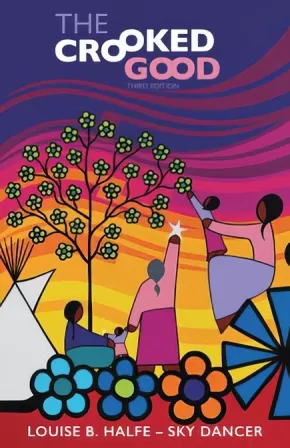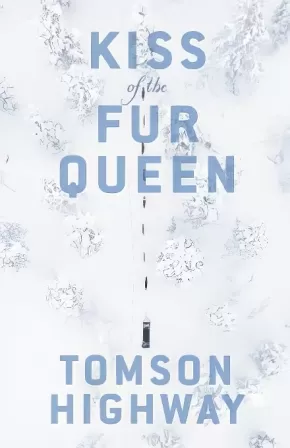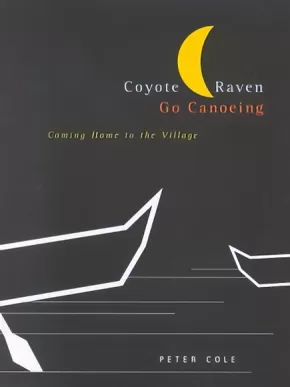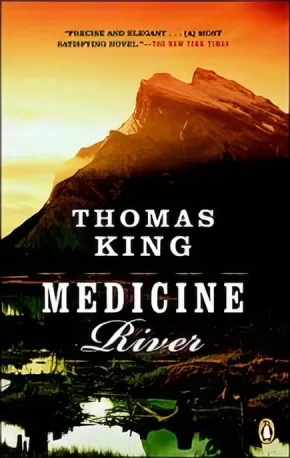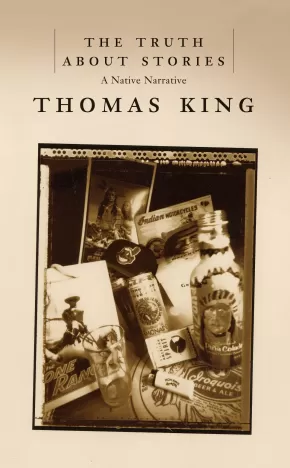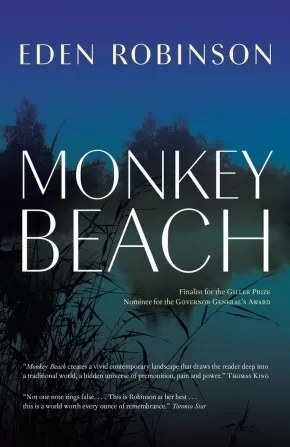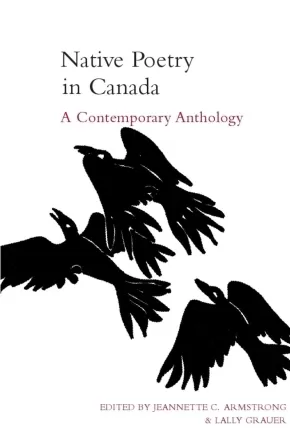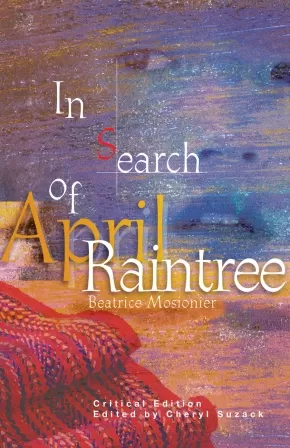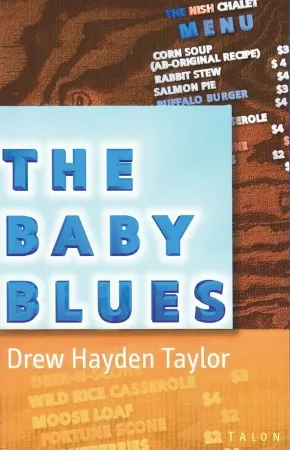Literary Studies
Synopsis:
From the earliest settler policies to deal with the “Indian problem,” to contemporary government-run programs ostensibly designed to help Indigenous people, public policy has played a major role in creating the historical trauma that so greatly impacts the lives of Canada’s Aboriginal peoples. Taking Back Our Spirits traces the link between Canadian public policies, the injuries they have inflicted on Indigenous people, and Indigenous literature’s ability to heal individuals and communities. Episkenew examines contemporary autobiography, fiction, and drama to reveal how these texts respond to and critique public policy, and how literature functions as “medicine” to help cure the colonial contagion.
Synopsis:
Poetic tales that unfold through the voice of ê-kwêskît, Turn-Around Woman--tales imbued with vital themes of Indigenous experience: culture, language, colonialism, residential schools and more. The poems of The Crooked Good are threaded throughout with names, phrases, and verses in Cree; its personal stories framed within the fireside tales of Rolling Head Woman, who is both nightmare and culture hero. Evocative, moving, and powerful poetry from a master poet.
Know my child, the mountains make your dreams. Keep decent and proper.
Serve your guest tea, scones, Never forget you’re Cree.
Reviews
“For those who might not know, you cannot be a student of Indigenous poetry without reading the words of Louise Halfe, and The Crooked Good is one of those books that needs to be near the top of your reading list. And for those, like myself, who have returned to this book many years after the first reading, what a gift and a blessing. Once again, after all these years. There are stories that are fossilized in their time and place, and then there are those stories that renew themselves and renew us, too, each time we return to them. Louise Halfe has given us one of those renewing stories. It is, too, a story about stories: how the stories we tell ourselves about ourselves, as individuals and cultures, can enrich our sense of self with the sacred, or how they can threaten to destroy and consume the good in us. Sometimes when the stories we tell ourselves have been colonised by others, we become meat in their gaping jaws. And then there is The Crooked Good, a song-story of violence and resilience, of lust and love, of the persistence of what’s ancient and the necessity of the ancient for our contemporary lives. Though the path we walk be a crooked one, always too, it is a good path to walk. Hay hay, Sky Dancer!”—Randy Lundy, author of Field Notes for the Self
“Cree mythoi animate Louise Halfe’s lustrous poetry. They are the existential materials of her works and worlds, and in their arrangements of consciousness, they assemble the present. All presents. In Halfe’s texts, one is compelled/pressed by these forms of apprehending. First, they structure the poetry and then they restructure the reader, the listener. Line after relentless line, thought after shattering thought, one encounters all that is lethal and all that is generative. The brilliant power of Halfe’s poetry is that it contains both the wound and its medicine—alive.”—Dionne Brand, poet, novelist, essayist.
“The best poetry makes the world larger, more vivid. It makes our crooked good hearts expand with understanding, compassion and vital lifeforce even while it tells us how it is, how it can be. This book enlarges. It expands our world. Energizes. More than good, in this brilliant and moving collection, Sky Dancer Louise B. Halfe makes the good larger.”—Gary Barwin, author of Nothing the Same, Everything Haunted
Educator Information
This brand new third edition (2021) has been beautifully redesigned and includes a new foreword by Kimberley Anderson, Canada Research Chair in Indigenous Relationships at the University of Guelph.
Louise Bernice Halfe was named Parliamentary Poet for Canada in February of 2021.
Additional Information
155 pages | 5.50" x 8.50" | 3rd Edition
Synopsis:
Kiss of the Fur Queen is a powerful and beautiful tale of siblings and tricksters, culture and trauma, and finding yourself in a world that tries to tell you who you are.
Born into a magical Cree world in snowy northern Manitoba, Champion and Ooneemeetoo Okimasis are all too soon torn from their family and thrust into the hostile world of a Catholic residential school. Their language is forbidden, their names are changed to Jeremiah and Gabriel, and both boys are abused by priests.
As young men, estranged from their own people and alienated from the culture imposed upon them, the Okimasis brothers fight to survive. But wherever they go, the Fur Queen--a wily, shape-shifting trickster--watches over them as they fulfill their destiny to become artists.
Educator Information
Grade 11/12 English First Peoples resource for the unit Further Steps toward Reconciliation - Understanding Residential Schools through Text.
Note: This novel contains mature and challenging material (profanity, coarse language, depictions of sex, sexual abuse, violence, etc.).
This resource is also available in French: Champion et Ooneemeetoo.
Additional Information
328 pages | 5.17" x 7.98"
Synopsis:
A lyrical, epic narrative about Aboriginal knowledge and education.
we are narrators narratives voices interlocutors of our own knowings
we can determine for ourselves what our educational needs are
before the coming of churches residential schools prisons
before we knew how we knew we knew
In a gesture toward traditional First Nations orality, Peter Cole blends poetic and dramatic voices with storytelling. A conversation between two tricksters, Coyote and Raven, and the colonized and the colonizers, his narrative takes the form of a canoe journey. Cole draws on traditional Aboriginal knowledge to move away from the western genres that have long contained, shaped, and determined ab/originality. Written in free verse, Coyote and Raven Go Canoeing is meant to be read aloud and breaks new ground by making orality the foundation of its scholarship.
Cole moves beyond the rhetoric and presumption of white academic (de/re)colonizers to aboriginal spaces recreated by aboriginal peoples. Rather than employing the traditional western practice of gathering information about exoticized other, demonized other, contained other, Coyote and Raven Go Canoeing is a celebration of aboriginal thought, spirituality, and practice, a sharing of lived experience as First Peoples.
Reviews
Additional Information
352 pages | 7.00" x 9.50"
Synopsis:
When Will returns to Medicine River, he thinks he is simply attending his mother's funeral. He doesn't count on Harlen Bigbear and his unique brand of community planning. Harlen tries to sell Will on the idea of returning to Medicine River to open shop as the town's only Native photographer. Somehow, that's exactly what happens.
Through Will's gentle and humorous narrative, we come to know Medicine River, a small Albertan town bordering a Blackfoot reserve. And we meet its people: the basketball team; Louise Heavyman and her daughter, South Wing; Martha Oldcrow, the marriage doctor; Joe Bigbear, Harlen's world-travelling, storytelling brother; Bertha Morley, who has a short fling with a Calgary dating service; and David Plume, who went to Wounded Knee. At the centre of it all is Harlen, advising and pestering, annoying and entertaining, gossiping and benevolently interfering in the lives of his friends and neighbours.
Educator Information
Recommended Grades: 10-11
Grade 10/11 English First Peoples resource included in the unit Relationships - Families, Friendships, Communities, and the Land.
Additional Information
320 pages | 5.31" x 8.25"
Synopsis:
"Stories are wondrous things," award-winning author and scholar Thomas King declares in his 2003 CBC Massey Lectures. "And they are dangerous." In his 2003 Massey lectures, award-winning author and scholar Thomas King looks at the breadth and depth of Native experience and imagination.
Beginning with a traditional Native oral story, King weaves his way through literature and history, religion and politics, popular culture and social protest, gracefully elucidating North America's relationship with its Native peoples.
Native culture has deep ties to storytelling, and yet no other North American culture has been the subject of more erroneous stories. The Indian of fact, as King says, bears little resemblance to the literary Indian, the dying Indian, the construct so powerfully and often destructively projected by White North America. With keen perception and wit, King illustrates that stories are the key to, and only hope for, human understanding. He compels us to listen well.
Reviews
"Trust a novelist and English professor to get to the heart of how stories and storytelling shape our perceptions. This is a wonderful study of the power of words." — Booklist
"A collection of thought-provoking essays examining the importance of the oral tradition. Storyteller Thomas King addresses Native cultural concerns and their primal link to storytelling. Intriguing and entertaining. Highly recommended for all tribal college collections and literature classes."— Tribal College Journal
"What is revealed in this graceful, even seductive book of essays about storytelling by the esteemed Cherokee novelist, radio personality, university professor, and Canadian émigré is that what is as important as the stories we tell about the world are the ways in which we interpret those stories." — World Literature in Review
"King’s addresses artfully combine literary and cultural criticism, traditional Native American stories, and personal experience." — The Bloomsbury Review
Educator Information
Essay series that is a study of First Peoples' storytelling in North America.
Grades 10-12 English First Peoples Resource for various units.
Curriculum Connections: English, Indigenous Studies, Civics and Careers, History, Humanities and Social Sciences.
Additional Information
208 pages | 5.08" x 8.00"
Synopsis:
Robinson''s mastery is confirmed in Monkey Beach, the first full-length work of fiction by a Haisla writer and an unforgettable story set in the wilds of the Pacific Northwest. This powerful novel reminds us that places, as much as people, have stories to tell.
Five hundred miles north of Vancouver is Kitamaat, an Indian reservation in the homeland of the Haisla people. Growing up a tough, wild tomboy, swimming, fighting, and fishing in a remote village where the land slips into the green ocean on the edge of the world, Lisamarie has always been different. Visited by ghosts and shapeshifters, tormented by premonitions, she can''t escape the sense that something terrible is waiting for her. She recounts her enchanted yet scarred life as she journeys in her speedboat up the frigid waters of the Douglas Channel. She is searching for her brother, dead by drowning, and in her own way running as fast as she can toward danger.
Circling her brother''s tragic death are the remarkable characters that make up her family: Lisamarie''s parents, struggling to join their Haisla heritage with Western ways; Uncle Mick, a Native rights activist and devoted Elvis fan; and the headstrong Ma-ma-oo (Haisla for "grandmother"), a guardian of tradition.
Haunting, funny, and vividly poignant, Monkey Beach gives full scope to Robinson''s startling ability to make bedfellows of comedy and the dark underside of life. Informed as much by its lush living wilderness as by the humanity of its colorful characters, Monkey Beach is a profoundly moving story about childhood and the pain of growing older--a multilayered tale of family grief and redemption.
Educator Information
Grades 10-12 BC English First Peoples resource.
Note: This novel contains mature subject matter such as drug use and depictions of sex and violence.
This book is available in French: Les esprits de l'océan
Additional Information
384 pages | 5.14" x 8.00"
Synopsis:
Native Poetry in Canada: A Contemporary Anthology is the only collection of its kind. It brings together the poetry of many authors whose work has not previously been published in book form alongside that of critically-acclaimed poets, thus offering a record of Native cultural revival as it emerged through poetry from the 1960s to the present. The poets included here adapt English oratory and, above all, a sense of play. Native Poetry in Canada suggests both a history of struggle to be heard and the wealth of Native cultures in Canada today.
Reviews
“This collection shows the breadth of contemporary Native poetry, from the resistance literature of the many poems remembering the murdered Helen Betty Osborne to the playful fishing game of Daniel David Moses; it is an excellent anthology.” — Terry Goldie, York University, co-editor of An Anthology of Canadian Native Literature in English
“Armstrong and Grauer have arranged a collection of works of extraordinary breadth in their thematic treatment of cultural, political, and spiritual subjects. Instructors will value the accompanying biographical information, the substantial selections from each poet’s work, and the authors’ prefatory comments, all of which situate this collection as an ideal text for the university classroom.” — Canadian Literature
Additional Information
360 pages | 6.00" x 9.00" | Paperback
Synopsis:
Memories. Some memories are elusive, fleeting, like a butterfly that touches down and is free until it is caught. Others are haunting. You'd rather forget them, but they won't be forgotten. And some are always there. No matter where you are, they are there, too.
In this moving story of legacy and reclamation, two young sisters are taken from their home and family. Powerless in a broken system, April and Cheryl are separated and placed in different foster homes. Despite the distance, they remain close, even as their decisions threaten to divide them emotionally, culturally, and geographically. As one sister embraces her Métis identity, the other tries to leave it behind.
Will the sisters’ bond survive as they struggle to make their way in a society that is often indifferent, hostile, and violent?
The first edition of In Search of April Raintree, published in 1984, has since touched many generations of readers, becoming a Canadian school classic. In this edition, ten critical essays accompany one of the best-known texts by an Indigenous author in Canada.
Educator Information
In this edition, ten critical essays accompany the text.
A 40th-anniversary edition of In Search of April Raintree is available here: In Search of April Raintree: 40th Anniversary Edition
A version written specifically for students in grades 9-12 that does not contain the graphic scene that is contained in this original version is available here: April Raintree
Additional Information
343 pages | 5.50" x 8.50" | Paperback | Critical Edition
Synopsis:
The Baby Blues is Drew Hayden Taylor’s highly wrought farce of patrimony in a stifling, politically correct, post-colonial milieu of “fancy dancers” of every stripe on the powwow trail. In juxtaposing three generations of careless wandering hedonists, progenitors of a string of offspring from their six-night stands, with their erstwhile naïve women partners who are always left holding the bag, the “big questions” of heritage, family, cultural context and personal identity are ruthlessly stripped of their conventional meanings and become so much useless, embarrassing roadkill on the highway of life.
Cast of 3 women and 3 men.
Additional Information
96 pages | 5.50" x 8.50" | Paperback




